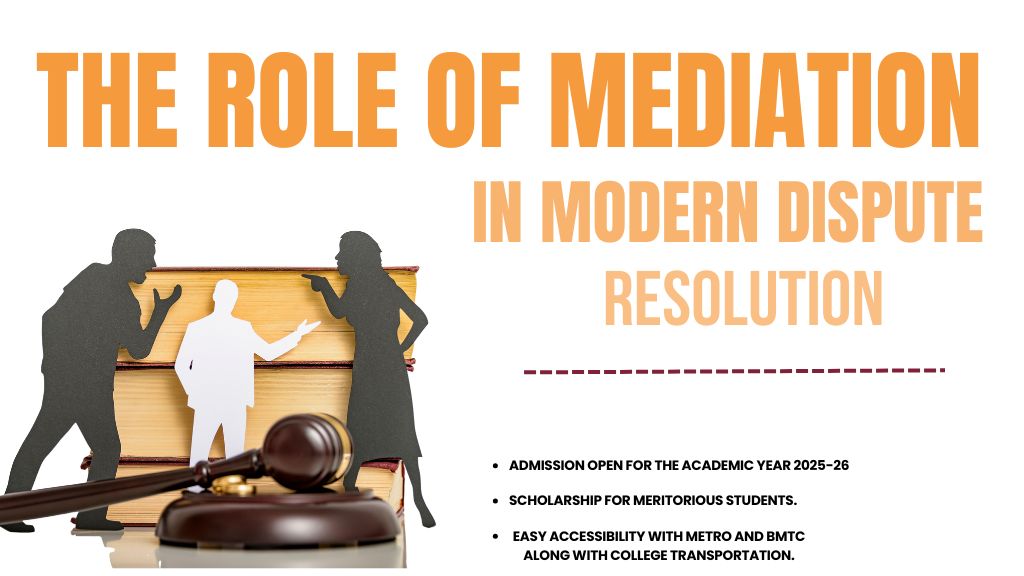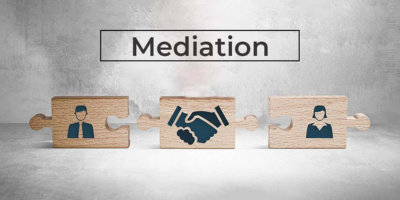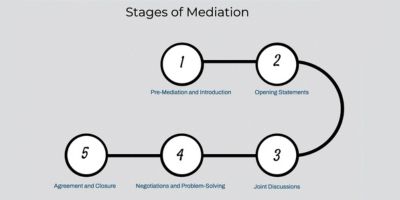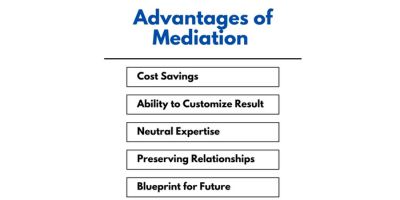The Role of Mediation in Modern Dispute Resolution.
🌿 Introduction
In the high-stakes, fast-paced, and economically demanding landscape of the modern world, legal conflicts require agile, efficient, and sophisticated solutions that traditional litigation often cannot provide. Mediation, a foundational and highly effective form of Alternative Dispute Resolution (ADR), has emerged as the essential process for meeting this need.
⚖️ What Is Mediation?
⚖️ Mediation: The Strategic Cornerstone of Modern Dispute Resolution (ADR).
In the high-stakes, economically demanding, and increasingly resource-conscious landscape of the modern world, legal disputes necessitate sophisticated solutions that prioritize efficiency and collaboration over adversarial combat. Mediation, a foundational pillar of Alternative Dispute Resolution (ADR), has transcended its role as a mere “alternative” to become the preferred, strategic mechanism for navigating conflict.
👩⚖️ Role of the Mediator
🧭 The Detailed Role of the Mediator.
The mediator is an impartial, neutral third party whose central function is to facilitate communication and guide the negotiation process. Crucially, a mediator does not make decisions, impose a settlement, or offer legal advice (unless they are acting as an evaluative mediator and all parties agree to it). They are the guardian of the process, not the judge of the outcome.
Essential Intervention Techniques.
Mediators rely on specialized techniques to break deadlocks and facilitate breakthroughs:
- Active Listening: The most fundamental skill. It involves giving full attention, reflecting, and summarizing the party’s story to show understanding, which builds trust and encourages them to open up.
- Example: Party A says, “I was disrespected, and I need a public apology.” The mediator responds, “It sounds like you felt seriously hurt by their public actions, and regaining your reputation is critical to settling this.”
- Reframing: Changing a negative, aggressive statement into a neutral, constructive question or statement of interest. This shifts the focus from blame to problem-solving.
- Example: Party B says, “He’s just being greedy and unreasonable!” The mediator reframes, “So the challenge we need to address is finding a financial solution that you both feel is fair and reasonable?”
- Caucusing (Private Sessions): Separating the parties into private rooms to hold confidential discussions. This allows the mediator to gather sensitive information, assess emotional barriers, and conduct “reality testing” without losing face in front of the other side.
- Hypothetical Scenarios: Presenting “what if” options to gauge a party’s flexibility and lead them toward a middle ground.
- Example: “What if, instead of a lump sum, we discussed a payment schedule spread over six months, paired with a non-disparagement clause?”
- Brainstorming: Encouraging parties to generate as many settlement ideas as possible without immediate judgment or criticism, fostering a sense of joint ownership over the resolution
Stages of Mediation in ADR.
The mediation process is a structured, voluntary, and confidential method of resolving disputes with the help of a neutral third party, the mediator. While the exact steps and terminology can vary, most formal mediations follow a similar sequence of stages.
Here is a general outline of the typical stages of mediation:
1. 🤝 Convening and Preparation.
This initial stage occurs before the mediation session formally begins.
- Agreement to Mediate: The parties and mediator agree on the process, including confidentiality rules, the mediator’s role, fees, and logistics (date, time, location).
- Information Exchange: Parties may submit summary briefs or position papers to the mediator outlining the dispute and their perspective.
- Logistics: The mediator handles all administrative and preparatory tasks to ensure the session can run smoothly.
2. 🗣️ Mediator’s Opening Statement.
The mediation session begins with all parties in the same room (a joint session or plenary).
- Introductions: The mediator introduces everyone present.
- Establish Rules: The mediator outlines their role as a neutral facilitator, explains the goals of mediation, confirms the principle of confidentiality, and establishes ground rules (e.g., no interruptions, respectful conduct).
- Process Overview: The flow of the mediation session is explained to ensure all parties know what to expect.
3. 📝 Disputants’ Opening Statements.
Each party presents their view of the dispute without interruption.
- Telling the Story: Each party (often starting with the person who initiated the mediation) presents their perspective on the conflict, the consequences they’ve faced, and what they hope to achieve.
- Emotional Expression: This stage allows parties to air their grievances and concerns, which can be an important step in moving past emotional barriers.
4. 🔍 Joint Discussion and Information Gathering.
The mediator facilitates a discussion to clarify the facts and identify the core issues.
- Questions and Clarification: The mediator asks open-ended questions to dig deeper, clarify facts, and ensure each party understands the other’s perspective.
- Issue Identification: The key issues and underlying interests (needs, concerns, priorities) are identified, often leading to a clearer agenda for discussion.
5. 🚪 Private Caucuses (Separate Sessions)
This is often the core work of the mediation, though it’s not always required. The mediator meets privately and separately with each party (and their legal counsel, if present).
- Confidentiality: Information shared in a caucus is strictly confidential and cannot be disclosed to the other side unless express permission is given.
- Reality Testing: The mediator helps each party assess the strengths and weaknesses of their case and the risks of not settling (e.g., going to trial).
- Developing Options: This safe, private space is used to brainstorm potential settlement options and explore proposals. The mediator acts as a shuttle diplomat, moving between rooms to convey offers and counter-offers (with permission).
6. 🤝 Negotiation and Settlement.
The parties begin to formalize an agreement.
- Bargaining: Offers and counter-offers are exchanged, either through the mediator (shuttle diplomacy) or in a joint session.
- Finalizing Terms: The parties, guided by the mediator, work toward a mutually acceptable resolution that addresses their interests.
7. ✅ Closure and Agreement.
The mediation concludes, regardless of the outcome.
- Written Agreement: If an agreement is reached, the mediator helps the parties draft a written settlement document (sometimes called a Memorandum of Understanding). This document outlines the terms and is signed by both parties, often becoming a legally binding contract.
- No Agreement: If no agreement is reached, the mediator may summarize the progress made and discuss options, such as meeting again later or pursuing litigation. The matter returns to the court or the parties’ original plan.
🌟 Advantages of Mediation / ADR.
- Time & Cost Efficient: Faster than court trials.
- Confidential: Discussions remain private.
- Flexible: Parties control the outcome.
- Preserves Relationships: Focuses on understanding, not winning.
- Legally Recognized: Settlement can be made enforceable by law.
⚠️ Disadvantages of Mediation / ADR
- Not binding unless parties agree.
- May fail if cooperation is low.
- Power imbalance can affect fairness.
Complex cases may still need court intervention.
🕊️ Conclusion🕊️
Mediation as the Embodiment of Humane Justice
The mediation process, with its distinct and predictable stages, offers a profound alternative to adversarial confrontation, proving that collaboration is the true spirit of justice. Unlike litigation, which assigns blame based on past events, mediation is a disciplined, future-focused journey designed to promote peace, communication, and fairness.
role of mediator pdf, advantages of alternative dispute resolution, disadvantage of alternative dispute resolution, stages of mediation in adr, mediation in adr notes





